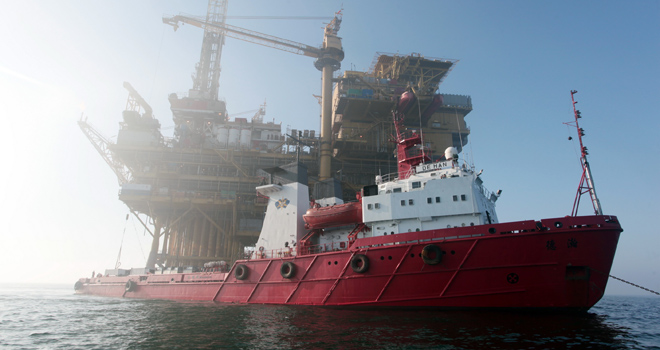More than two months since the first leak was discovered, U.S. oil giant ConocoPhillips announced Tuesday it was resuming its efforts to clean up the series of oil slicks spilled into China’s Bohai Sea.
The spill, which contaminated about 460 square miles, came from two leaks on a well field run by Conoco in partnership with a state-run corporation. The problem was detected on June 4 but went officially unreported for a month, after a blog leaked the news on June 21, according to the Guardian. The Chinese government initially downplayed the extent of the accident, but confirmed the spill on July 6, announcing that the water quality in the affected area had fallen to the lowest of its four categories.
The first leak was found to be caused by increased pressure from water injections on the ground of the 84-foot-deep seabed. This type of leak was the first of its kind to happen in China, and is also rarely seen worldwide, the state oceanic administration told China’s Global Times.
In July, ConocoPhillips estimated between 1,500 and 2,000 barrels had leaked into the sea, and that no oil had reached shore.
The government blamed its delayed notification on “technical limits” in collecting information to map out the extent of the disaster, emphasizing that fishing activity was low in the polluted area anyway. It called for an official apology from Conoco for delaying cleanup efforts, and recently launched an investigation into the company’s role in the spill.
Oil companies can face, at most, a $30,000 fine (200,000 yuan) for polluting waters in China. BP, by contrast, faces tens of billions of dollars in penalties for the Deepwater Horizon spill last May.
Ma Jun, head of the Institute of Public and Environmental Affairs, a nongovernmental organization in Beijing, told the LA Times that China’s disclosure laws for such disasters are vague, and state sympathy for the industry is commonplace.
“For decades, China’s policy is to promote economic development,” Ma said. “So all of these companies have enjoyed some special protection.”
An editorial in the Global Times blatantly speculated that the relationship between the government and the oil industry looks to be too close.
“We cannot help but wonder: Is the [State Oceanic Administration] a serious watchdog that exists to prevent bigger incidents from happening, or a loving parent who is overprotective of his own child?”
The Bohai Sea disaster comes exactly a year after two pipeline explosions off the coast of Dalian became one of China’s worst reported oil spills, halting fishing around the major port for over a month and contaminating 268 square miles of sea. Cleanup is estimated to take a decade.
The government said 11,000 barrels of oil were spilled in the accident, while independent experts put the amount at 650,000 barrels, according to the LA Times.
Just weeks before the Dalian spill, the state-owned Zijin Mining Group Co. waited nine days before disclosing a gold mining chemical spill in Fujian province that polluted a major fishing river, killing 2,000 tons of fish. The company was fined $4.6 million and its environmental protection officer and three other company managers were sentenced to three-year jail terms this May, though some received probation.
This disconcerting legacy has sparked anger from environmental groups, and China’s Economic Observer boldly accused China National Offshore Oil Corporation of hiding the most recent accident in an act of “savage public relations”.
According to the LA Times, 11 Chinese environmental advocacy groups announced plans to file a joint lawsuit calling for more transparency in the Chinese oil industry, though it has little chance of reaching court.
“In China, incidents of this magnitude are seldom ever handled in the courts,” a Chinese environmental law expert at UC Berkeley Law School told the Times. “They’ll almost always be handled by the government.”
Industry accidents and cover-ups are by no means exclusive to China. The Guardian reported that more than 100 oil and gas spills happened in the North Sea in 2009 and 2010, and went largely unannounced. The average is about one spill a week.
According to the documents leaked to the Guardian, the two rigs with the most frequent oil spills are owned by Shell and the French conglomerate Total.
Shell Exploration recently won tentative approval for a plan to drill in the Arctic waters off the coast of Alaska. Several key steps still block the company from beginning production, including federal approval of Shell’s spill response plan, which conservationists say is woefully inadequate and does not account for the harsh conditions of the icy water north of Alaska. Cleaning up crude “amid ice floes, the towering waves of Arctic storms and the long hours of dark” adds significant uncertainty to Shell’s proposal, the LA Times reports.
If approved, drilling could begin as early as next July.










